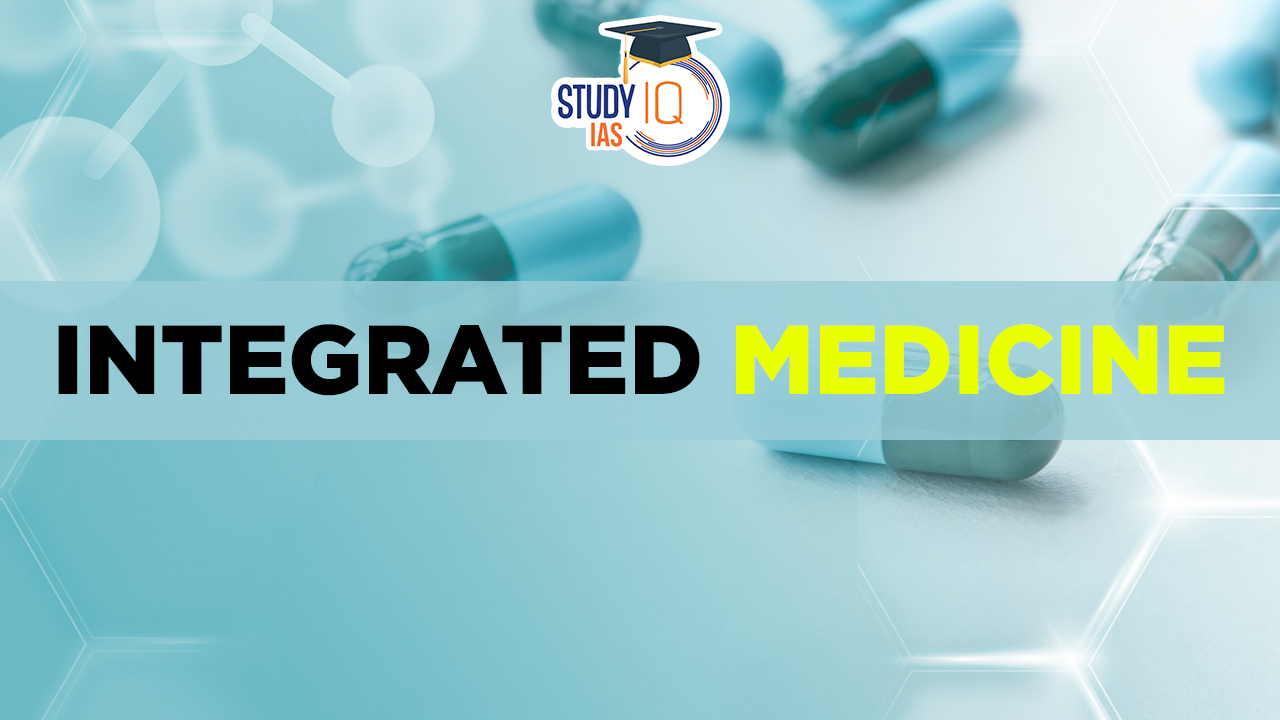Table of Contents
Context: The Indian Council of Medical Research (ICMR) and the AYUSH Ministry have signed a MoU for collaboration and cooperation for research in the field of integrated medicine.
Integrated Medicine
- Integrated medicine refers to using alternative medicine systems such as ayurveda, yoga, naturopathy, unani, siddha and homeopathy with orthodox systems as part of a treatment.
- The significance of Yoga, Ayurveda, Homeopathy, Siddha and Unani medical systems have grown especially due to the challenges of Non-Communicable Diseases (NCDs), multidrug-resistant diseases, lifestyle disorders, long term diseases.
- Importance:
- Integrative medicine is aimed at harnessing the potential of India’s rich heritage and medical knowledge, along with using modern advancements in allopathy.
- Opening Integrative Medicine Centres at all government medical establishments will help in initiating co-location of practitioners of Indian system and modern medicine.
- Integrative Medicine Centres can be crucial in providing services like Panchakarma therapies & concomitant medicines which will provide a promotive, preventive, curative and rehabilitative therapy.
- Both traditional and modern medical practices would help in providing better avenues of health and wellness.
Traditional Medicine Systems and Orthodox Medicine Systems
- Traditional Medicine Systems: As per WHO, it is the total sum of the “knowledge, skills and practices indigenous and different cultures have used over time to maintain health and prevent, diagnose and treat physical and mental illness”.
- In India, traditional medicine is defined as including practices and therapies such as yoga, Ayurveda, Siddha that have been part of Indian tradition historically, as well as others such as homeopathy — that became part of Indian tradition over the years.
- Ayurveda and yoga are practised widely across the country.
- Siddha system is followed predominantly in Tamil Nadu and Kerala.
- Sowa-Rigpa system is practised mainly in Leh-Ladakh and Himalayan regions such as Sikkim, Arunachal Pradesh, Darjeeling, Lahaul & Spiti.
- In India, traditional medicine is defined as including practices and therapies such as yoga, Ayurveda, Siddha that have been part of Indian tradition historically, as well as others such as homeopathy — that became part of Indian tradition over the years.
- Orthodox Medicine Systems: It is a system in which medical doctors and other healthcare professionals (such as nurses, pharmacists, and therapists) treat symptoms and diseases using drugs, radiation, or surgery.
- It is also called allopathic medicine, biomedicine, conventional medicine, mainstream medicine, and Western medicine.
Key Points of the MoU
| Integrative Health Research | Cooperation and collaboration between Ministry of AYUSH and ICMR for exploring the areas of convergence and synergy for integrative health research and strengthening research capacity. |
| Diseases of National Importance | M/o Ayush and ICMR shall work on public health research initiatives for addressing diseases of national importance. |
| High-Quality Clinical trials for Validation | Efforts will be made to conduct high-quality clinical trials jointly on diseases of national importance with promising therapies of Ayush system to generate evidence for wider acceptance. |
| Joint Working Group | A joint working group will be created between the Ministry and the ICMR that will hold quarterly meetings for exploring further areas of collaboration and to work on deliverables. |
| Research Capacity | The fostering of research capacity will be led by ICMR for Ayush researchers.
It will develop a curriculum, facilitate the development and delivery of training modules. Scholars and researchers of the organisations will have access to advanced instrumentation systems, and other infrastructural facilities. |
| Seminars and Workshops | Both institutions will conduct conferences, workshops and seminars with participation of researchers interested in the field of integrated healthcare. |
| Significance | It will combine traditional knowledge with modern research and boost ayurveda’s identity on the basis of scientific evidence.
This collaboration will promote integrative research to generate evidence in priority areas of national importance in healthcare utilizing modern scientific methods. This MoU will prove to be very important in enriching Ayush system of medicines. This cooperation will facilitate scientific validation and provide evidence for AYUSH systems by other countries. This collaboration will lead to Ayush departments in AIIMS to evolve into departments of Integrated Medicine across entire AIIMS infrastructure in India. This move will offer patients the benefit of integrated medicine in India. |
Major Bottlenecks in Traditional Systems
- Trust-Deficit: There is a major trust-deficit in the soundness of Ayurvedic theories and the fruitfulness of its practices. Ayurveda is not the medical system of first choice for many people.
- Lack of Scientific Validation: Ayurveda has failed to keep pace with the intellectual and scientific advances of the times. So, it has diminished evidence-based quality.
- Sub Standard Courses: Ayurvedic practitioners’ graduation courses are often substandard and the post-graduate courses offered at most of their institutes are of extremely poor quality.
- Lack of Practice: While MBBS graduates and post-graduates from public hospitals have to mandatorily serve a specified bond period in rural areas, graduates and post-graduates from AYUSH public hospitals are not subjected to any such restrictions.
- Lack of Ecosystem: Ayurveda lacks a vibrant ecosystem of science and research.
- Trial and Error Methods: Ayurvedic practitioners have to discover treatments and approaches that actually work. It involves a lot of trial and error with patients and leads to an erosion of the practitioner’s reputation.
- Lack of Investment: Despite numerous efforts made by individuals and organizations to conduct research, the lack of investment into Ayurvedic research has been a major setback.
- Less Integration with Modern Medicine: Ayurveda can be used safely and efficaciously only in about 60%-70% of primary-care illnesses. For rest, Ayurveda needs to be integrated with modern medicine.
- Overuse of AYUSH Medicine: Ayurveda medicines are sold as over the counter products and nutraceuticals to avoid regulation. Ayurvedic stores do not have a legal requirement of a pharmacist to dispense the medications unlike pharmacies selling modern medicine.
Major Bottlenecks in Orthodox Systems
- Lack of infrastructure: India has been struggling with deficient infrastructure in the form of lack of well-equipped medical institutes with low rate of building such medical teaching or training facilities.
- Shortage of efficient and trained manpower: One of the most pressing problems in India remains a severe shortage of trained manpower in the medical stream.
- Unmanageable patient-load: There is a need to adopt technology wherever possible to streamline the operational and clinical processes for healthcare facilities in order to manage efficient patient flow.
- High out-of-pocket expenditure remains a stress factor: While public hospitals offer free health services, these facilities are understaffed, poorly equipped, and located mainly in urban areas.
Government Initiatives for AYUSH Systems
- Government of India is implementing Centrally Sponsored Scheme of National AYUSH Mission (NAM) for promotion of AYUSH system.
- Grant-in-aid is being provided to State Governments for development and promotion of Ayurveda, Yoga & Naturopathy, Unani, Siddha and Homoeopathy.
- NAM also supports cultivation of medical plants, production of quality and standardized ingredient for supply of Ayush, integration of medicinal plants in farming systems and increasing export of value added items of medicinal plants.
- WHO – Global Center for Traditional Medicine is the first and only center of its kind in Jamnagar, Gujarat which focuses on innovation and technology to optimize the contribution of traditional medicine to global health and sustainable development.
- The government has special Ayush Visa category for foreign nationals, who want to come to India to take advantage of Ayush therapy.
- A special Ayush mark for Ayush products and network of Ayush parks has been undertaken to encourage the promotion, research and manufacturing of Ayush products in India.
- A new category named ‘Ayush Aahar’ has been announced which facilitates the producers of Ayurvedic nutritional supplements.
- With the aim of boosting infrastructure and promoting research in traditional medicine, three National Ayush Institutes have been established:
- All India Institute of Ayurveda (AIIA), Goa, National Institute of Unani Medicine (NIUM), Ghaziabad and the National Institute of Homoeopathy (NIH) have been set up.
- Ministry of Electronics and Information Technology is providing technical support for digitalisation of Ayush Sector under the Ayush Grid project.
- The Traditional Knowledge Digital Library has been created which contains information about Ayurveda, Unani, Siddha, Sowa Rigpa and Yoga.


 SSC CGL Exam 2025 Apply Online Starts Ap...
SSC CGL Exam 2025 Apply Online Starts Ap...
 Daily Quiz 19 April 2025
Daily Quiz 19 April 2025
 Vehicle-to-Grid (V2G) Technology and its...
Vehicle-to-Grid (V2G) Technology and its...





















